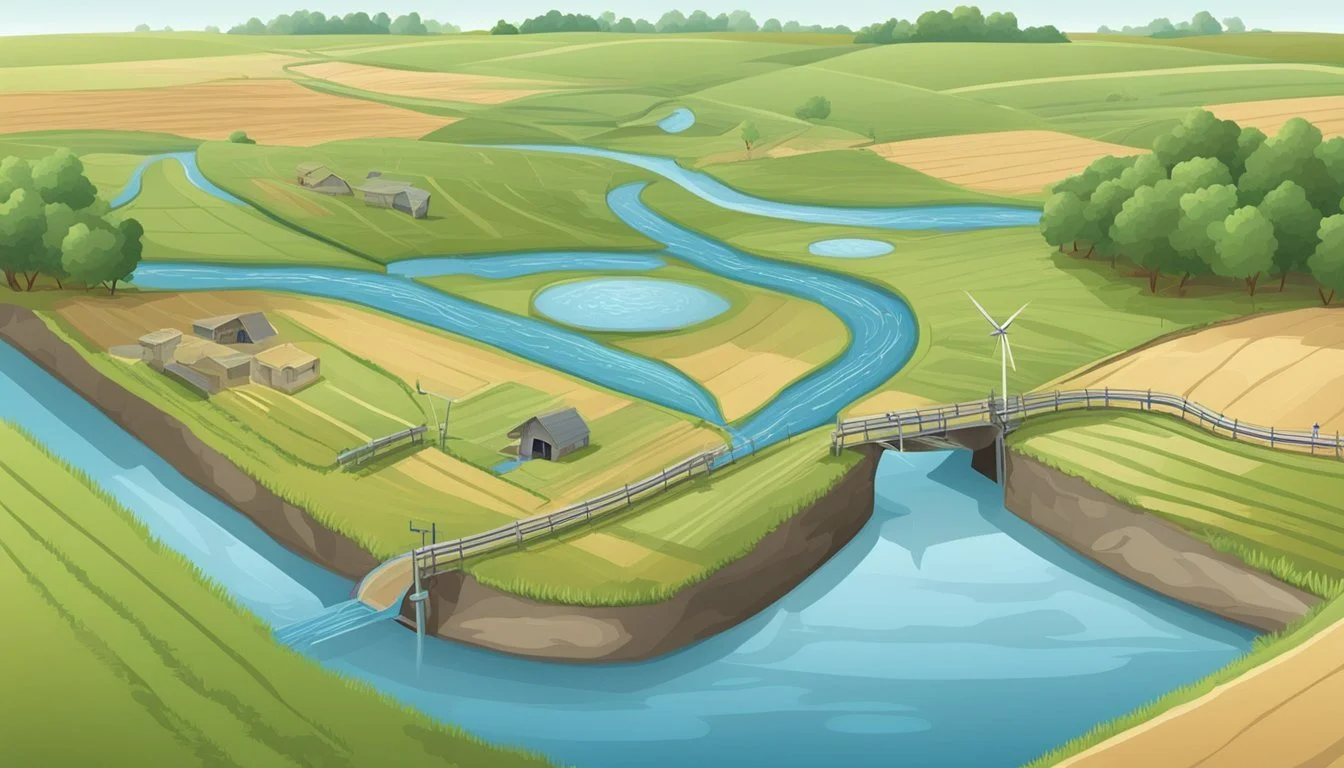Water Rights in Tennessee
Navigating Ownership and Use Laws
Water rights in Tennessee are governed by a combination of state regulations and common law principles, which together create a framework for the use and management of the state's water resources. The state's approach to water rights is rooted in the doctrine of riparian rights, a system inherited from English common law. Under this doctrine, the owners of land adjacent to or containing natural water bodies, such as rivers and lakes, have the right to make reasonable use of the water. These rights hinge on the idea that such use should not interfere with the rights of other landowners or the water's natural flow.
As Tennessee's population grows and the demands on its water supply increase, the management of water resources becomes increasingly complex. Tennessee's state government, through agencies such as the Division of Water Resources, plays a pivotal role in addressing these challenges. The agency is responsible for implementing statutes and regulations that pertain to water quality and supply, wellhead protection, and other critical aspects of water resource management. This regulatory apparatus functions to ensure that water rights are respected and that the state’s water resources are protected and sustainably managed for future generations.
Historical Context of Water Rights in Tennessee
Tennessee's water rights are grounded in traditions that balance public need with private ownership. They have evolved through statutory frameworks influenced by both the state's own legislative actions and interpretations of common law precedents.
Origins of Water Use Law
Tennessee originally adopted the riparian doctrine from English common law, which bases water rights on land ownership adjacent to watercourses. These rights allowed landowners the use of the water that flowed through or by their property for both domestic and agricultural needs, provided they did not harm downstream owners by significantly altering flow or quality. Through the years, these laws have been shaped to address the complexity of water needs in a modern context, such as the demand for municipal water supplies and industrial use.
Influence of Common Law
Although Tennessee law initially mirrored the English common law approach to water rights, the Supreme Court has played a significant role in interpreting these laws to suit the changing landscape of water use. These interpretations have upheld the fundamental riparian rights while also recognizing the necessity for sensible use and reasonable sharing of water resources. Over time, case law in Tennessee has sought to refine the balance between private property rights and the public's interest in water as an essential resource.
Understanding Water Rights and Regulations
In Tennessee, water rights encompass the legal entitlements regarding the use of water resources. These rights are governed by both state statutes and federal regulations to ensure safe and equitable water use.
Definition of Water Rights
In Tennessee, water rights are typically based on the riparian doctrine for surface water, entitling property owners with land adjacent to a body of water the usage of that water. These rights include the extraction of water for personal and commercial purposes, subject to state regulations that aim to preserve the water's safety and integrity for all users.
State vs. Federal Jurisdiction
While Tennessee has its own framework for managing water rights, the Environmental Protection Agency (EPA) plays a critical role in overseeing environmental safeguards. Federal and state jurisdictions often collaborate to regulate water quality, with the former primarily responsible for establishing nationwide standards and the latter tailoring regulations to address state-specific needs and conditions.
Water Quality Control Act
The Water Quality Control Act is a cornerstone of Tennessee's environmental legislation, regulating the quality of both surface and groundwater. It is designed to protect water resources against pollution and to maintain their safe and beneficial uses. Compliance with this act is mandatory for all who seek to utilize water resources within the state's borders, aligning with both Tennessee's legal requirements and federal mandates from entities like the EPA. The act serves as a framework to ensure that water remains safe for consumption and other uses, with the Tennessee Division of Water Resources being the chief administrative body in enforcing these regulations.
Tennessee Department of Environment and Conservation
The Tennessee Department of Environment and Conservation (TDEC) is crucial in overseeing the state's water resources. From ensuring water usage compliance to maintaining water quality, TDEC's multifaceted approach plays a pivotal role in water stewardship in Tennessee.
Role and Responsibilities
TDEC is charged with the stewardship of Tennessee's natural resources, including the management of water resources. This encompasses both surface waters, such as lakes and rivers, and groundwater, which includes aquifers. They issue advisories and regulate water resources to ensure public health and environmental quality are upheld. In essence, TDEC acts as both protector and regulator of Tennessee’s water resources.
The department operates various monitoring programs to track the condition of the state’s water bodies. These programs serve to detect and address pollutants that can affect water quality and ecosystem health. TDEC also ensures compliance with state and federal water regulations, striving to prevent contamination and enforce remedial measures when necessary.
Water Resources Management
Under the TDEC Division of Water Resources (TDEC DWR), the management of Tennessee's water resources is conducted rigorously. The Division's responsibilities include administering permits for water withdrawals and discharges, as well as comprehensive water quality management.
Surface Waters: Maintenance of the quality of surface waters is carried out through periodic assessments and the enforcement of standards to mitigate pollution sources.
Groundwater: TDEC DWR also ensures sustainable use and protection of groundwater, including aquifers, to prevent overuse and contamination.
Through both proactive and reactive measures, TDEC’s goal is to safeguard water resources for current and future generations, addressing issues that may affect water availability and quality across the state.
Water Resources in Tennessee
Tennessee's water resources encompass a vital network of surface and groundwater systems that are crucial for drinking water, ecological health, and economic prosperity in the state.
Surface Water
Tennessee is rich in surface water resources, with numerous rivers, including the Tennessee, Cumberland, and Mississippi Rivers, which are instrumental to the state's environment and economy. The TDEC’s Division of Water Resources is responsible for overseeing these water bodies, maintaining their quality, and ensuring they meet regulatory standards.
Groundwater
Groundwater is another significant component of Tennessee’s water resource portfolio. It serves as the primary drinking water source for many residents, especially in rural areas. Groundwater quality and quantity are regulated to protect against over-extraction and contamination, with recent legal developments affirming the need for equitable apportionment of this vital resource.
Drinking Water Infrastructure
The infrastructure for drinking water in Tennessee consists of an extensive system of treatment plants, pipelines, and storage facilities. This infrastructure is designed to ensure that water meets or exceeds standards set by the Environmental Protection Agency (EPA). The state is continually investing in this area as detailed by the Tennessee H2O plan, which addresses the challenges and strategies for the development of water resources and infrastructure to cater to the growing demand and changing climate conditions.
Quality Assessment and Control
In Tennessee, water quality and control are regulated through a comprehensive assessment process and oversight mechanisms to ensure safety and sustainability of the state's water resources.
Monitoring and Assessment Process
The Division of Water Resources conducts regular monitoring to evaluate the state of Tennessee’s water bodies. Data from these monitoring efforts guide decision-making and policy development. The monitoring program systematically collects samples and measures indicators like metals and iron to detect pollution levels and evaluate compliance with water quality standards.
Total Maximum Daily Loads (TMDL)
TMDL is a regulatory term describing the maximum amount of a pollutant that a body of water can receive while still meeting water quality standards. Tennessee determines TMDLs as part of its strategy to keep water sources clean and safe. These loads are calculated for pollutants of concern, inclusive of metals and other contaminants, ensuring they do not exceed levels that are harmful to the water ecosystem or public health.
Pollutants and Advisories
The state issues advisories when pollutants are identified at levels that may pose health risks. These often include contaminants such as metals, which can be detrimental even in small quantities. Public advisories are critical in safeguarding human health, while ongoing water quality control measures aim to reduce and manage pollutant levels in Tennessee’s water systems.
Legal Aspects and Water Rights Allocation
Water rights in Tennessee are determined by a combination of state law and interstate agreements. These laws regulate the allocation and use of both surface and groundwater resources.
Rights to Surface Waters
In Tennessee, surface water rights are primarily governed by the riparian doctrine, which grants use rights to landowners whose property adjoins a watercourse. The Tennessee's Legal Framework for Water Supply stipulates that riparian owners share the right to reasonable use of water, as long as it does not significantly harm other riparian owners. Uses often include domestic purposes, agriculture, and industry.
Rights to Groundwaters
Groundwater, on the other hand, is regulated differently. According to Tenn. Code Ann. § 69-7-304(a), the extraction of more than 10,000 gallons of water per day from ground sources must be registered with the commissioner. This entails obtaining permits and complying with regulations to ensure that water withdrawals do not exceed the recharge rate and cause unwanted drawdown. Tennessee’s approach places emphasis on sustainable use and management of groundwaters.
Interstate Water Compacts
Tennessee has been involved in disputes with neighboring states regarding water rights, including litigation reaching the Supreme Court regarding the use of aquifers. Such disputes highlight the challenges in interstate water sharing and the necessity of compacts to manage these shared resources. Unlike disputes between other states, such as California and Mexico, Tennessee's water rights issues are primarily with other U.S. states, such as the conflict over the Mississippi Aquifer that led to the Supreme Court siding with Tennessee.
In managing water resources, compacts — agreements between two or more states approved by Congress — play a critical role in conflict resolution and sustainable water allocation.
Water Rights and Land Ownership
Water rights in Tennessee are intrinsically tied to land ownership and are governed by the principles of riparian and appropriative rights. These rights specify the legal use and management of water resources on or adjacent to one's property.
Riparian Rights
In Tennessee, riparian rights are established under the premise that water usage rights are inherently connected to the ownership of land that abuts a body of surface water. These rights allow the landowner to use water from the stream, river, or lake that their property borders. The usage must be considered "reasonable" to not infringe upon the rights of other landowners. According to the Tennessee legal framework for water supply, even if a watercourse is non-navigable, riparian rights still apply, although the state may own the stream bed.
"Reasonable use" includes domestic purposes and could potentially cover irrigation, power generation, and recreational purposes.
Legal disputes involving damages or interference with these rights are typically resolved in courts on a case-by-case basis.
Appropriative Rights
Appropriative rights, contrastingly, are not a primary doctrine in the state of Tennessee. In some western states where water shortages are common, "first in time, first in right" guides water allocation. However, Tennessee's sufficient rainfall and water availability mean that the appropriative system is not the standard. Instead, water resource allocation adheres to the riparian rights doctrine, ensuring that those who own land adjacent to water are granted use.
The state does not practice a system where water rights are separated from land ownership, thus no rights are typically granted solely based on prior usage or need.
In cases where water is drilled or extracted from the ground, such as with groundwater, its usage aligns more closely with the ownership rights of the overlying land, upholding the riparian rights principle.
It is noteworthy that understanding specific water rights and how they interact with land ownership is essential for any landowner or entity engaging in activities that involve water usage or access in Tennessee.
Challenges and Considerations in Water Management
In Tennessee, water management presents a complex interaction between environmental sustainability and economic development. These challenges and considerations are multifaceted and necessitate a delicate balance to ensure both the safety and availability of water resources.
Environmental Concerns
The health of Tennessee's water resources directly impacts its ecosystems and the availability of quality drinking water. The Environmental Protection Agency (EPA) plays a crucial role in overseeing that water quality standards are met. However, environmental stressors such as pollution, habitat loss, and invasive species continue to threaten these resources. It is vital to address these impacts through stringent quality control measures and regular monitoring to avoid water quality degradation that can lead to health advisories.
Economic Implications
The economic implications of water management are significant. Water is not only a public necessity but also a critical component of many industries. A strong water supply framework supports agricultural, manufacturing, and tourism sectors. Consequently, ensuring safe and reliable access to water is key to economic stability. Nevertheless, without proper investments in water infrastructure, the potential for water scarcity and quality issues becomes a substantial economic risk. It is important that news and developments in water management are communicated effectively to inform and guide decisions of policymakers and stakeholders.
Frequently Asked Questions
This section provides concise answers to common inquiries regarding water rights and regulations in Tennessee, focusing on legal frameworks and homeowner responsibilities.
How is the natural flow rule applied in Tennessee water law?
In Tennessee, the natural flow rule is generally used to determine water rights, focusing on allowing water to flow in its natural course without unreasonable interference by riparian landowners.
What are the regulations for drilling a private well in Tennessee?
Regulations for drilling a private well in Tennessee require individuals to obtain permits and ensure compliance with construction standards to protect groundwater resources and public health.
Under Tennessee law, what determines whether a creek is considered private property?
A creek in Tennessee is considered private property if it is non-navigable and runs through privately owned land, giving the landowner exclusive use and enjoyment of the water.
What does the Tennessee Water Quality Control Act entail for property owners?
The Tennessee Water Quality Control Act mandates that property owners adhere to state policies on water pollution and land use, part of biennial reporting on water quality called the 305(b) Report.
How do Tennessee laws address property disputes involving drainage onto neighboring lands?
Tennessee laws dictate that property owners must manage their land drainage in a manner that does not harm neighboring properties, often involving assessments on alterations to natural flow and the establishment of responsibility for damages.
What are the guidelines for constructing and maintaining ponds in Tennessee?
For constructing and maintaining ponds, Tennessee has guidelines to ensure they do not negatively impact the environment or surrounding land use, with permits often required for larger or commercial-use ponds to assess impact on local water resources.







